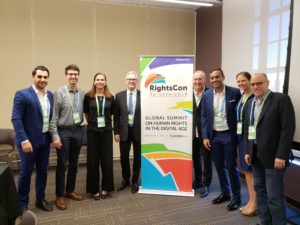
From left to right: Aria Iliad Ahmad, me, Dr. Jillian Clare Kohler, Tim Smith, Ron Andruff, Dr. Shivam Patel, Tracy Cooley, and Robert Guerra.
Last year I organized a panel at a conference called RightsCon to bring together Internet freedom and medicines rights activists to talk about buying medication online. And last week, I participated on a panel at RightsCon in Toronto that continued and strengthened those initial efforts. It was an honor to be on that panel, especially to hold discussions with academic experts in pharmaceutical safety and access with important roles working with the World Health Organization (WHO).
For those of you who are new to this blog, the work at RightsCon is directly relevant to PharmacyChecker’s mission to inform patients about safe and lower-cost medication options available on the Internet. Essentially, large pharmaceutical companies are lobbying governments and Internet companies to take actions that will prevent you from getting less expensive medications. This is also an issue about free speech and Internet freedom that should increasingly attract even more digital rights activists. Big Pharma is pressuring governments to pressure Internet gatekeepers to take down content. This is the Stop Online Piracy Act by a thousand cuts. We are trying to push back against that.
RightsCon is an annual conference focusing on the intersection of human rights and digital rights (issues related to the Internet). Access to medication has become an important issue at the United Nations, including by the Human Rights Council, which passed a resolution in 2016 declaring access to essential medicines a human right. Also, the UN convened a panel in 2016 dedicated to this issue, called the UN High Level Panel on Access to Medicines. Thus, the title of this year’s panel was Making Safe Online Access to Affordable Medication Real: Address the UN Human Rights resolution for access to essential medicines.
In 2017, the central goal of the panel was to draft a set of principles about the sale of medication on the Internet to serve as guidance to patients, Internet and other private companies, non-governmental organizations, and international organizations. Indeed, named after the location of the conference, we drafted the Brussels Principles on Medication Sales Over the Internet.
Here’s a history on PharmacyCheckerBlog of Rightscon 2017: https://pharmacycheckerblog.com/tag/rightscon.
At the panel last week in Toronto, the participants discussed and analyzed the Brussels Principles with a critical eye. Our goal was to explain what they mean, why they are important, and how they might be revised, eventually to bring them to a larger audience of public and private stakeholders and finalize a new set of principles with accompanying pharmacy safety standards.
The panel was comprised of myself, representing Prescription Justice and PharmacyChecker.com; Dr. Jillian Clare Kohler, a professor at the Leslie Dan Faculty of Pharmacy, the Dalla Lana School of Public Health and the Munk School of Global Affairs and Director of the WHO Collaborating Centre for Governance, Transparency & Accountability in the Pharmaceutical Sector; Aria Iliad Ahmad, a PhD candidate at the Balsillie School of International Affairs, specializing in global health governance, and formerly on the WHO Drug Safety and Vigilance Unit; Tim Smith, head of the Canadian International Pharmacy Association; Tracy Cooley, executive director of the Campaign for Personal Prescription Importation; Shivam Patel, director of pharmacy verifications and information at PharmacyChecker; and Robert Guerra, a civil society expert specializing in issues of internet governance, cyber security, multi-stakeholder participation, internet freedom and human rights. The panel was hosted by Ron Andruff, an expert on Internet governance policy and the International Corporation of Assigned Names and Numbers.
The heart of the matter is for us all to ask what principles and ethics should apply when deciding what is best for patients who wish to buy medication online. To me, much of the answer lies in the Brussels Principles, which envision the widest possible access to safe and affordable medication. Now we have the opportunity to revise those principles with greater academic rigor and scrutiny and build around them an annex of safety standards and protocols that meet their intent. I’m confident that PharmacyChecker has created a terrific blue print of online pharmacy safety standards and rules to further develop and refine.
Tagged with: and Robert Guerra, Aria Iliad Ahmad, brussels principles, Dr. Jillian Clare Kohler, Rightscon, Ron Andruff, Shivam Patel, Tim Smith, Tracy Cooley


I am in the DONUT hole with 2nd quarter purchases.
My drugs are:
Breo Ellipta
Eliquis
Spirva
Simvastatin
Cardizem
The other misc items – approx. seven – I pay out of pocket.
My income is too great to get a $ 10.00 deal (Breo and Eliquis ) but each contributes $1,000, against my approx $ 3,600(approx. annual budget before the Donut Hole.
The deals are out of sync.
Thanks.
This is really a good work done by pharmacy checker. and yes it is very important to implement principles to serve medicines to patients.
Thanks.
Thank you, Suresh!
This is really a good work done by pharmacy checker. and yes it is very important to implement principles to serve medicines to patients.